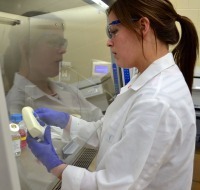Junior chemistry major, Mary Wickert, aspires to use her scientific knowledge to help others – both in and out of the laboratory. She is currently considering applying to the Alliance for Catholic Education program next year to pursue a Master’s Degree in Education and teach high school chemistry. This semester, Wickert is working in Dr. Amanda Hummon’s lab, whose focus is the biology of cancer, specifically colorectal cancer.

“I wanted to do research because I think it’s a very practical application of my chemistry major, and I wanted to concrete way to help people. In my opinion, that’s essentially what scientific research does. It looks for ways to make the world a better place,” Wickert said.
As a member of the Chemistry Club, Wickert first met Dr. Hummon at her “Last Lecture” presentation. Dr. Hummon provided an overview of her research as well as advice for students – what she would say if it was her last lecture.
“She presented her research in a way that was easy to understand and very welcoming, and so I wanted to know more. I was particularly drawn towards her work with cancer research, and I was able to relate to her very well because we both have close family members who have been affected by cancer,” Wickert said.
Wickert is currently working on a project that explores changes to the proteome following RNA interference-based reduction of the expression of pivotal regulatory genes that regulate the viability of colorectal cancer cells. She is currently studying the protein CASP8AP2/FLASH.
“My role is to help characterize proteins that are present in a colorectal cancer cell after FLASH is knocked down by analyzing a western blot. The goal is that there will be enough evidence to show that when FLASH is knocked down, the growth of the cancer cell is affected,” Wickert said.
By studying the loss-of-function protein, researchers in Dr. Hummon’s lab are working to further the understanding of how the cancer cell works, what it needs to grow and proliferate.
“Since our lab uses analytical techniques to study the biology of cancer, I think that it’s a great way to show that there is a lot of overlap among the fields of scientific research. Cancer is something that affects nearly everyone, so I feel that our lab’s contribution to cancer research is a really great way to help reach the end goal of finding ways to treat and cure cancer,” Wickert said.